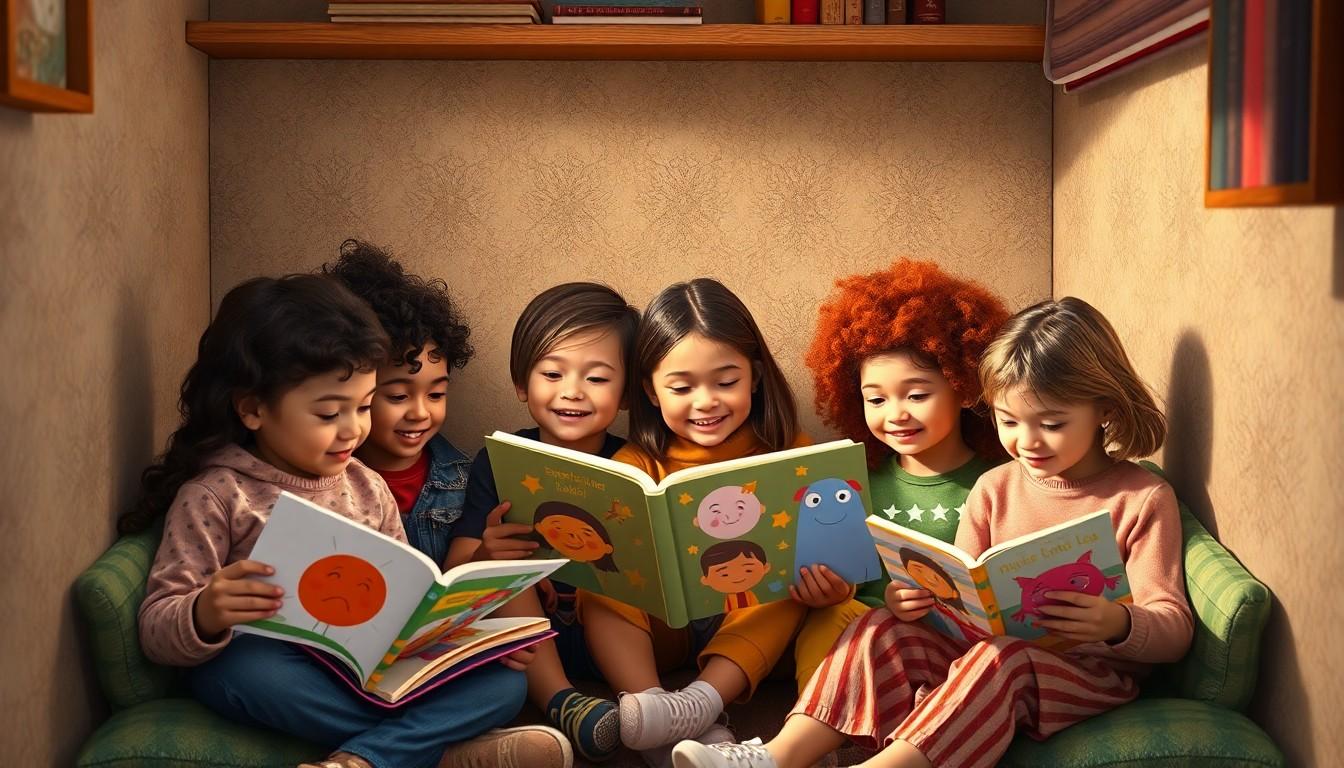Table of Contents
ToggleIn a world where kids juggle homework, friendships, and the occasional existential crisis, mental health books for kids are like superhero capes for their minds. These delightful reads not only entertain but also equip young readers with the tools to navigate their emotions. Imagine a story that turns anxiety into a quirky monster or sadness into a silly cloud—who wouldn’t want to dive into that?
Parents often wonder how to start conversations about feelings with their little ones. With the right book in hand, they can transform these discussions into fun adventures. These pages are filled with laughter, empathy, and invaluable life lessons, making mental health as approachable as a cozy bedtime story. So let’s explore some fantastic titles that can turn the sometimes scary topic of mental health into a journey of understanding and growth for kids.
Importance Of Mental Health Books For Kids
Mental health books for kids serve as essential resources that foster emotional literacy. Young readers gain insights into their feelings, helping to normalize conversations about mental health. These books present complex emotions like anxiety and sadness in ways children can easily comprehend. Understanding these emotions becomes crucial as they develop coping skills for life’s challenges.
Accessible language allows children to relate. Stories often feature characters facing hurdles similar to their own, creating a sense of connection. Engaging illustrations enhance these narratives, capturing the interest of young minds while reinforcing key messages. Reading these books encourages empathy and kindness, not only towards themselves but also towards others.
Encouraging open conversations about feelings can break down stigmas. Parents and caregivers, through these stories, find opportunities to discuss mental health topics openly. Guidance emerges from these discussions, equipping children with the tools to express themselves confidently and seek help when needed.
Promoting emotional intelligence at a young age leads to resilient adults. Data shows that early intervention through literature significantly improves mental health outcomes for children. By engaging with mental health books, kids learn that it’s okay to feel a range of emotions and that seeking help is a sign of strength.
Through understanding and acceptance, mental health books empower children. These valuable resources build a strong foundation for emotional exploration, promoting overall well-being as they navigate childhood and beyond.
Recommended Mental Health Books For Kids
Mental health books for kids provide valuable insights into emotions and coping mechanisms. These resources come in various formats, catering to different age groups and reading levels.
Picture Books
Picture books offer a gentle introduction to mental health themes. Titles like The Color Monster by Anna Llenas help children identify and articulate their feelings through vibrant illustrations. Another favorite, In My Heart by Jo Witek, describes emotions using relatable imagery, making it easier for kids to understand complex feelings. These stories often feature characters facing challenges, encouraging empathy and connection. Engaging narratives promote discussions between parents and children, creating a safe space for emotional expression.
Chapter Books
Chapter books delve deeper into emotional exploration for older kids. Wonder by R.J. Palacio illustrates themes of kindness, acceptance, and resilience through its compelling storyline. Readers follow Auggie as he navigates school and the challenges of being different. Another notable title, Inside Out and Back Again by Thanhha Lai, addresses themes of change and adaptation amid adversity. These books build emotional intelligence by presenting relatable situations, encouraging young readers to reflect on their own experiences. Accessible language and relatable characters make discussions about mental health approachable for children.
Themes Explored In These Books
Mental health books for kids delve into various themes that resonate with young readers. These themes foster understanding and promote emotional wellness.
Emotions And Feelings
Understanding emotions and feelings forms a crucial part of many children’s mental health books. These stories depict characters grappling with joy, sadness, fear, and anger. Readers relate to the experiences through vivid illustrations and engaging narratives. Titles like “The Color Monster” simplify complex emotions by categorizing them into colors, making it easier for kids to identify their feelings. Books encourage discussions about emotions, which helps normalize these conversations. This practice allows children to express themselves openly, enhancing their emotional vocabulary and literacy.
Coping Strategies
Implementing coping strategies is another vital theme in mental health literature for children. Stories often depict characters facing challenges, teaching readers effective methods for managing stress and anxiety. Techniques may include deep breathing, identifying safe spaces, or talking to trusted adults. Through relatable situations, young readers learn how to navigate their emotional landscapes. For instance, “In My Heart” illustrates various coping mechanisms that children can practice during tough times. This emphasis equips kids with tools to confront their feelings, fostering resilience and emotional growth.
Benefits Of Reading Mental Health Books
Reading mental health books offers several key benefits for children. First, these books foster emotional literacy, allowing young readers to identify and express their feelings clearly. Through relatable characters and engaging narratives, children see their emotions reflected in stories, making it easier to discuss complex feelings.
Additionally, mental health books encourage open conversations about emotional well-being. When kids understand their emotions, they’re more likely to share their experiences with parents, which promotes understanding and support. This open dialogue reduces stigma and helps normalize discussions about mental health.
Cultivating empathy forms another crucial benefit. Stories featuring diverse characters facing various challenges enable children to put themselves in others’ shoes. Readers learn to appreciate different perspectives and experiences, which enhances their interpersonal skills and emotional intelligence.
Coping strategies become accessible through these narratives. Many mental health books illustrate effective ways to manage stress and anxiety, equipping children with practical techniques they can apply in real-life situations. For instance, “In My Heart” provides clear coping mechanisms, making it simple for kids to practice these strategies when tough times arise.
Building resilience marks a significant advantage of engaging with these stories. As children navigate the experiences of different characters, they develop the ability to bounce back from setbacks. This resilience prepares them for challenges they might face throughout childhood and later in life.
Moreover, early intervention through literature shows measurable improvements in mental health outcomes. Data indicates that exposure to mental health topics at a young age reduces the likelihood of developing severe emotional issues. By reading these books, children gain tools that promote overall well-being and emotional exploration.
Conclusion
Mental health books for kids play a crucial role in nurturing emotional intelligence and resilience. By offering relatable stories and engaging illustrations, these books help children articulate their feelings and understand complex emotions. They also encourage open dialogue between kids and caregivers, breaking down stigmas surrounding mental health.
As children explore these narratives, they gain valuable coping strategies and learn to navigate their feelings effectively. This foundation not only fosters emotional wellness during childhood but also sets the stage for healthier adults. Investing in mental health literature for young readers is a powerful step towards promoting overall well-being and emotional growth.





